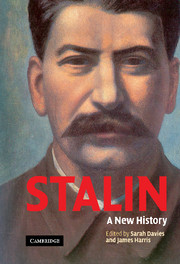Book contents
- Frontmatter
- Contents
- Notes on contributors
- Preface
- A note on transliteration
- Glossary
- 1 Joseph Stalin: power and ideas
- 2 Stalin as Georgian: the formative years
- 3 Stalin as Commissar for Nationality Affairs, 1918–1922
- 4 Stalin as General Secretary: the appointments process and the nature of Stalin's power
- 5 Stalin as Prime Minister: power and the Politburo
- 6 Stalin as dictator: the personalisation of power
- 7 Stalin as economic policy-maker: Soviet agriculture, 1931–1936
- 8 Stalin as foreign policy-maker: avoiding war, 1927–1953
- 9 Stalin as Marxist: the Western roots of Stalin's russification of Marxism
- 10 Stalin as Bolshevik romantic: ideology and mobilisation, 1917–1939
- 11 Stalin as patron of cinema: creating Soviet mass culture, 1932–1936
- 12 Stalin as producer: the Moscow show trials and the construction of mortal threats
- 13 Stalin as symbol: a case study of the personality cult and its construction
- 14 Stalin as the coryphaeus of science: ideology and knowledge in the post-war years
- Index
3 - Stalin as Commissar for Nationality Affairs, 1918–1922
Published online by Cambridge University Press: 24 November 2009
- Frontmatter
- Contents
- Notes on contributors
- Preface
- A note on transliteration
- Glossary
- 1 Joseph Stalin: power and ideas
- 2 Stalin as Georgian: the formative years
- 3 Stalin as Commissar for Nationality Affairs, 1918–1922
- 4 Stalin as General Secretary: the appointments process and the nature of Stalin's power
- 5 Stalin as Prime Minister: power and the Politburo
- 6 Stalin as dictator: the personalisation of power
- 7 Stalin as economic policy-maker: Soviet agriculture, 1931–1936
- 8 Stalin as foreign policy-maker: avoiding war, 1927–1953
- 9 Stalin as Marxist: the Western roots of Stalin's russification of Marxism
- 10 Stalin as Bolshevik romantic: ideology and mobilisation, 1917–1939
- 11 Stalin as patron of cinema: creating Soviet mass culture, 1932–1936
- 12 Stalin as producer: the Moscow show trials and the construction of mortal threats
- 13 Stalin as symbol: a case study of the personality cult and its construction
- 14 Stalin as the coryphaeus of science: ideology and knowledge in the post-war years
- Index
Summary
Although Stalin had been an important member of the Bolshevik Party prior to 1917, nothing in his experience could have prepared him for the tasks thrust on him after the October Revolution. As a leading commissar in the Red Army, as a commissar, and as a Party secretary and eventually General Secretary, he had political and organisational responsibility for a large number of people. He had to learn not only how to exercise the authority that had been granted to him, but also how to deal with regular contact with a wide variety of people, how to juggle their demands, and how to defend himself politically in verbal conflict with subordinates and equals alike. His experience as Commissar of Nationality Affairs, a position he held from 1918 through to the winding-up of the position with the creation of the USSR at the end of 1923, provided Stalin with the opportunity to exercise leadership at both the theoretical and practical level. It can, therefore, be expected to have had a major influence on his later leadership both in the policies he pursued and in the ways in which he exercised power.
Nevertheless, Stalin's role as Commissar has often been overlooked in accounts of his early Soviet career. At first sight, there are good reasons for this neglect. First, the Commissariat for Nationality Affairs (Narkomnats), although theoretically responsible in many ways for some 22 per cent of the population of the RSFSR, was, and is, viewed as a minor commissariat dealing with a so-called ‘soft’ policy area which had little weight against the far more powerful institutions dealing with the economy, the army, and internal security, not to mention the Russian Communist Party (RKP(b)).
- Type
- Chapter
- Information
- StalinA New History, pp. 45 - 62Publisher: Cambridge University PressPrint publication year: 2005
- 8
- Cited by



